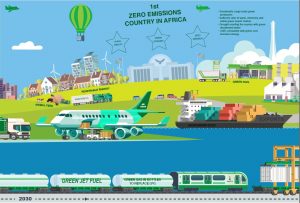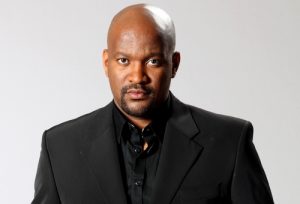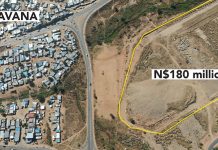By Timo Shihepo | 7 December 2020
A SOUTH African businessman who served on president Hage Geingob’s economic recovery panel has been appointed to co-manage part of state-sanctioned environment projects that are to involve N$10 billion in spending.
The projects, baptised as New Green Economy 2030, in Namibia’s 14 regions will be implemented by the state-owed Environmental Investment Fund of Namibia (EIF) and South Africa’s Growth Catalyst Fund, which is owned by Vuyo Jack.
Jack was appointed by Geingob to the high-level panel on the economy last year. The state-owned environment fund has over the years emerged as a cash cow for the political elite.
EIF chief executive officer Benedict Libanda confirmed the value of this deal. “If you combine all projects in the plan, it will give you a total cost of N$10 billion,” he told The Namibian last month.
Documents show that the programme, launched by Geingob last week, includes 30 targets such as growing food in the desert for N$90 million.
The food being considered includes rice, animal feed, fish feed, coconuts, olives, nuts, and avocados.
Other projects include liquified biogas for TransNamib at Tsintsabis, a sustainable airline fuel project in Kunene, vegetable oil in Oshakati, compressed liquified biogas for TransNamib at Grootfontein and organic rice projects at Oranjemund.
The plan also incorporates two large-scale desalination and water pipeline projects earmarked for Namibia and Botswana, a salt and freshwater fish project in the Oshikoto region, a fodder project at Oshivelo and a zero-emissions fertiliser plant at Otavi, among others.
More information contained in a document titled ‘Namibia: New Green Economy 2030’ (Version 1-20 November 2019) shows that the projects are aimed to produce 110 billion litres a year of desalinated water and to produce 300 megawatts of electricity.
Other aims are exporting 400 million litres of green airline fuel yearly as well as exporting 500 000 tonnes of green animal feed.
The projects aim to cut imports of fuel, dairy products and vegetables. They will attempt to do so by changing 290 000 hectares of desert into farmland.

The overall target is to create 410 000 sustainable agricultural jobs.
The Cabinet has directed the Ministry of Environment, Forestry and Tourism and the Ministry of Fisheries and Marine Resources to oversee the work done by the EIF and the Growth Catalyst Fund in line with the Environment Management Act.
Speaking at the launch of the document last week, Geingob said the aim is to deliver a sustainable ocean economy, where protection, sustainable production and prosperity go hand in hand.
“The document sets out a 100% vision for good ocean management, and a headline commitment to establish and enact sustainable ocean plans by 2025,” said Geingob.
He said the country is uniquely positioned to leverage its oceanic assets to benefit its people. “We are determined to develop a green and blue economy that will ensure that our natural resources are at the centre stage of our drive to deliver economic prosperity,” he said.
THE DEAL
The memorandum of understanding between the EIF and the Growth Catalyst Fund was signed in February 2020.
A pre-feasibility scoping trip by a team of four people from the Growth Catalyst Fund, including Jack, took place from 15 to 27 March 2020. The team is yet to meet community stakeholders such as chiefs and village headmen in the areas where the projects are to be implemented.

Information contained in a presentation by the EIF and the Growth Catalyst Fund shows that the plan has been approved by Cabinet.
Libanda told The Namibian last month that the government will only pump N$30 million into the projects. He said the African Development Bank and the Development Bank of Southern Africa have signed agreements to invest a combined N$5 billion.
Despite insisting that the state will only spend N$30 million on the projects, information seen by The Namibian shows that the EIF and the Growth Catalyst Fund have been asking the government for financial backing.
This includes a proposal regarding a post-Covid-19 green recovery and stimulus plan to the government.
They also asked the government to provide a N$100 million revolving facility from the environmental levy. “This will be paid back to the fiscus at the end of the project preparation period,” the document said.
They have also asked the government to provide about N$200 million in equity capital from the environmental levy to Namibians to empower beneficiary entrepreneurs to participate in the New Green Economy 2030 projects.
Alternatively, the partners have asked the government to use the existing African Development Bank facility by taking N$100 million to cover New Green Economy 2030 project preparation activities. The government is yet to respond to these appeals.
The plan makes provision for Namibians to own at least 25% of all 30 projects.
“Well, it depends on how much the project is worth. If a module (project) is worth N$100 million, one can’t come with their N$15 million. We need to be honest,” Libanda said when asked how small businesses would benefit.
The Namibian understands politicians are circling around these deals.
“Politicians are of course politicians, but I don’t want to talk about politics,” Libanda said.
The first projects in the plan are expected to start in March next year.
Jack told The Namibian last month that the New Green Economy 2030 aims to be a catalyst for generating rural wealth in Namibia.
PRESIDENTIAL SUPPORT
State House appears to have funded some activities of the South African businessman in Namibia.

“The travel and accommodation costs were covered by the Office of the President,” the presentation said.
“The only costs incurred by the Presidency with regard to the activities of Vuyo Jack relates to his work as a member of the high-level panel on the Namibian economy, which ended in March 2020,” State House spokesperson Alfredo Hengari told The Namibian last month.
This is despite contrary evidence.
The EIF was then tasked to take over some of the costs from April 2020 and transfer the responsibility from the Office of the President.
“There are some costs that have been incurred by the EIF as part of the local scoping activities that are accounted for as part of the project preparation costs which are recoverable,” Jack said.
Information in The Namibian’s possession shows that the EIF has committed N$3 million to project preparation activities which is recoverable from the New Green Economy 2030 modules once they get to the construction stage.
Hengari and Libanda refused to disclose how much has been spent on Jack and his team.






